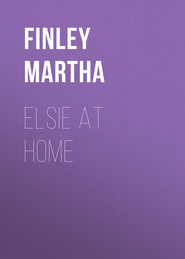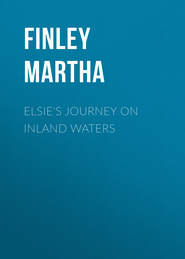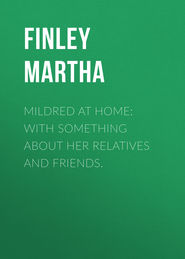По всем вопросам обращайтесь на: info@litportal.ru
(©) 2003-2024.
✖
Mildred's New Daughter
Настройки чтения
Размер шрифта
Высота строк
Поля
“O Ethel, you have to say more than one verse, haven’t you?” asked Blanche.
“Oh, yes, so I have. ‘Believe on the Lord Jesus Christ and thou shalt be saved,’ is another one that mamma taught me. I’ll say it. Such a sweet verse, isn’t it?”
“Yes, indeed,” returned Blanche.
“Saved from what, Ethel?” asked Harry. “I don’t want to live here with these horrid folks. I wish He’d saved us from that.”
“But it would be a great deal worse to live in that dreadful place where the devil and his angels are,” said Ethel with grave earnestness; “and that’s what mamma said Jesus would save us from; that and the love of sin. Oh, now I remember some verses she taught me about heaven: ‘And God shall wipe away all tears from their eyes; and there shall be no more death, neither sorrow, nor crying, neither shall there be any more pain; for the former things are passed away.’ Oh, just think, children! never a headache, or backache, or heartache, or hurt feelings, or any sort of pain or ache, but always to feel bright and happy and well. And that’s where papa and mamma are – well and glad all the time.”
“O Ethel, how delightful!” exclaimed Blanche. “And then oughtn’t we to be glad for them?”
“Yes, indeed! though we can’t help being sorry for ourselves and each other, because we must do without them till we get there too.”
Jane, the servant girl, opened the door and looked in at that moment. “Come, you young uns, and eat your dinners,” she said. “You’s to eat fust this time ’fore de folks gits home from church.”
The children obeyed right willingly, but were disappointed to find only the usual plain fare.
“I ’spected a nice dinner to-day,” grumbled Harry; “chicken or birds, and mashed potatoes and cranberries and good pie and cake.”
“O Harry, dear, hush, hush!” Ethel said warningly, but half under her breath. “I’m afraid you’ll get beaten or starved if – if they should find out that you talked so.”
“Oh, it’s too hard!” sighed Blanche. “I didn’t want to stay with that hateful, cross old Aunt Sarah though.”
“I didn’t either,” said Harry. “But ’most everybody’s bad to us since papa and mamma went away.”
Here Jane, who had gone back to her kitchen, poked in her head at the communicating door. “You’d better stop talkin’ and get you dinners eat up ’fore the folks gits home from chu’ch; ’cause ef ye don’t maybe you’ll have to stop hungry.”
The thought of that alarming possibility at once silenced every complaint, and hardly another word was spoken till their appetites were fully satisfied. A hasty washing of hands and faces followed and was scarcely over when the Cootes returned, and the little folks were summoned to the study and required to recite their verses of Scripture to the frowning, loud-voiced, impatient dominie, while the dinner for him and his wife was being set upon the table. It seemed a dreadful ordeal to the trembling little ones, and a great relief when it was over and they were ordered up to their own room for the remainder of the day.
CHAPTER IX
Considering her extreme youthfulness, it was a hard and toilsome life that had now begun for Ethel. Day and night she had charge of her little brother and sisters; she must wash and dress them – or teach them to do those things for themselves, and see in every way to their comfort and amusement; also teach Nannette and Harry their little lessons. Besides she must learn her own, keep their room in order, and spend an hour or two every day in the use of her needle, under the instruction of Mrs. Coote, who was very strict and exacting, though she occasionally bestowed a few words of warm praise when she considered it to have been well earned.
On such occasions Ethel’s cheek would flush and her eyes brighten as she listened, a feeling akin to love for the usually cold-mannered woman tugging at her heart strings; but ere she could summon up courage for the expression of her pleasure and budding affection, the cold, distant manner had returned, and chilled and disappointed she could say no more than, “Yes, ma’am; thank you for praising my work. I mean to try always to do it as well as ever I can.”
Meantime the intimacy between the Eldons and little Mary Keith grew and increased. From the first they seemed to take great pleasure in each other’s society, and would play together in unbroken harmony by the hour; generally in Mr. Keith’s grounds as Mrs. Coote was entirely willing to have them there, Mary’s mother and grandmother no less so; and when Ethel’s tasks were finished she was allowed to join the others. Her gentle, quiet, ladylike manner made her a great favorite with the ladies and she was sometimes allowed to do her stint of needlework there, sitting quietly with them while the younger children romped and played about the garden or on the porches.
There were some pictures on the wall of the pretty sitting room where the ladies spent most of their time, one of which particularly attracted Ethel’s attention; it was a woodland scene – a little valley, a small creek with a dam, running through, it, near by a horse tethered to a sapling, and at a little distance, partly hidden by a thicket, a noble looking man in Continental uniform, on his knees in prayer.
“Mrs. Weston, who is that gentleman praying there in the woods?” Ethel at length ventured to ask.
“That is a picture of our Washington at Valley Forge,” answered the lady, bestowing a look of loving admiration upon the kneeling figure.
“Washington?” repeated Ethel enquiringly. “I think I never heard of him before. He was a good man, I suppose?”
“Yes, my dear, and a great one also. I think there was never a better or greater mere man. He is called the father of his country because, with the help of God, he did more to gain her liberties than any other man.”
“Oh, if it isn’t too much trouble, will you please tell me about him and what he did?” Ethel asked eagerly, adding, “I’m only a little girl, you know, ma’am, and haven’t lived in America very long; so I don’t know much about its history.”
The lady smiled, and softly stroking the child’s hair, “Do you call yourself English, my dear?” she asked in a pleasant tone.
“No-o, ma’am,” returned Ethel doubtfully; “papa was English but – but mamma, you know, was born on this side of the ocean, so I suppose I’m only half English, and Cousin George told me I’d have to be an American now, as I’ve come to live in this country.”
“And you don’t object?”
“Oh, no, ma’am; America seems a very good country and my cousins are all Americans, because they were born here.”
“Yes; the generality of us Americans think these United States, taken all together, make the best land the sun shines on, as it certainly is the freest.”
“Are all the people in it good, ma’am?” queried Ethel innocently.
“No, my dear, I am sorry to have to acknowledge that that is far from being the case. True very many of the wicked ones – burglars, murderers, and the like – are of foreign birth or parentage, but some are natives and the children of natives. But I must answer your question about Washington. He was the great-grandson of a gentleman named John Washington, who came over from England and settled in Virginia, which was then an English colony, as were the other twelve States. There were thirteen in all of those that formed the Union in the beginning. Do you know anything about how the colonies were settled in the first place?”
“No, ma’am.”
“Well, then, I must tell you that one of these days. But now you want to know about the picture. What you see there occurred during the first war with England, the war which set us free and made the colonies States. This country was then far smaller and poorer than it is now; for we have now many large and flourishing States; more than three times as many as there were then.”
“Yes, ma’am; Cousin George told me I ought to be glad to be an American, because this was the very best and freest country in the world.”
Mrs. Weston gave the little girl a pleased smile. “I entirely agree with Cousin George,” she said, “and ever since I can remember have been glad and thankful that God gave me my birth in this dear, Christian land, many of whose people came here when it was but a desolate wilderness, in order that they might be free to worship God according to the dictates of their own consciences.
“But I must tell you about the picture. Washington was the commander-in-chief of our armies during the war of the Revolution, which ended in making us free States.
“That war began in the year 1775; the Declaration of Independence was made in the summer of 1776; but it took years of fighting to induce the King of England and his Cabinet to acknowledge that we were actually a free and independent people, no longer subject to their oppressive acts; a long and terrible struggle was necessary to bring that about.
“By the fall of 1777 a good many battles had been fought; one of them – the battle of Saratoga – won a great victory for the Americans; but things had not gone so well for us farther south. Washington had suffered defeat at the battle of the Brandywine and in consequence the British had got possession of Philadelphia. Our troops must if possible be kept together through the cold winter, and that in some place from which the British could be watched and prevented from getting away to any great distance, to do mischief to the people of the land.
“There was no town that would answer the purpose, and the place that suited best was Valley Forge on the Schuylkill River, twenty-one miles above Philadelphia. It was a little valley lying between two ridges or hills and covered by a thick forest. The poor soldiers had no tents and were in sore need of clothes, also of blankets and shoes. They – even the officers – were astonished when Washington ordered the trees cut down and log huts built of them. But they spent their Christmas holidays at the work and were much surprised and delighted at their success, when they found that they had changed the forest into cabins thatched with boughs, in the order of a regular encampment.
“But oh, what suffering they still had to undergo for lack of food and clothing! Many were almost, some entirely, naked.
“For more than two years the war had been going on and for four months they had been fighting the enemies of their country, marching and counter-marching day and night in order to baffle the designs of the foe against their dear native land; and they had come to this spot with naked, bleeding feet and destitute of supplies of every kind.
“It was a dreadful winter for that poor army. Washington did all he could, but it was out of his power to relieve anything like all the suffering; and Congress was strangely apathetic, and slow to do what it might have done to give relief.
“Because of their sad neglect the condition of the poor, patient soldiers grew worse and worse so that men died for want of straw or other bedding to raise them at night from the damp, cold earth; and sometimes they had no fuel to make fires, for want of shoes and stockings to enable them to go through the snow and cut it in the woods near at hand; often they had no meat, sometimes no bread, and there was danger that they would perish with famine or have to disperse in search of food.”
“And why didn’t they?” asked Ethel. “I should think anything would be better than staying there freezing and starving to death.”
“Because they loved their country and her liberties better than they loved themselves,” replied Mrs. Weston. “They were fighting for her, for their own homes, wives, and children, yet, as I have said, Congress was most shamefully neglecting them, while most of the people in the vicinity of their camp were Tories – that is in favor of the British, unwilling to do anything for the cause of freedom, and ready to help the foes of their country, for which these poor, starving, bleeding, freezing men were willing to lay down their lives.
“But Washington was their friend, doing all in his power for them, showing a fatherly concern and fellow-feeling for all their troubles and privations, exerting himself in every way to help and encourage them, and urging Congress to come to their relief.
“Washington was a Christian man; so he carried the troubles and distresses of his poor soldiers, and the woes of his bleeding country to God, who is the hearer and answerer of prayer. Probably the woods were a more private place than any other to which he had access at that time; and I presume he never knew that any earthly creature had ever seen him at his devotions.”
“Who was it that saw him, Mrs. Weston?” asked Ethel.
“The man at whose house he was lodged: Mr. Isaac Potts. He owned the dam, and one day was strolling toward it, along the bank of the creek, when he heard a solemn voice, and walking quietly in the direction of the sound, he saw Washington’s horse tied to a sapling and near by, in a thicket, the dear man himself on his knees in prayer, with the tears coursing down his cheeks.”











